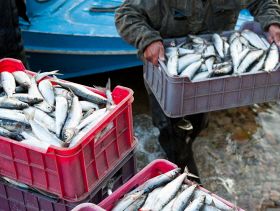 d Pelagic Sustainability Group (NIPSG) Irish Sea herring fishery has become the first Irish Sea fishing fleet to gain Marine Stewardship Council (MSC) certification. This means it is recognised as a sustainable and well managed fishery.
d Pelagic Sustainability Group (NIPSG) Irish Sea herring fishery has become the first Irish Sea fishing fleet to gain Marine Stewardship Council (MSC) certification. This means it is recognised as a sustainable and well managed fishery.MSC’s UK & Ireland Fisheries Outreach Manager, Claire Pescod, welcomes the certification: "This is excellent news. Herring is a key species in the MSC program with around 4,000 MSC certified herring products available worldwide. This is the first Irish Sea herring fishery to be certified and will help meet the demand for verifiably sustainable seafood, benefitting both the fishermen who have put the hard work in to achieve certification and consumers looking for a greater availability of MSC products."
Atlantic herring (Clupea harengus) has been fished in the Irish Sea since the Middle Ages. The NIPSG targets this species using only three boats – pelagic trawlers - with fishing taking place mainly during the hours of darkness. These boats, Voyager, Stephanie M and Havilah, are all over 49 metres long and equipped with state of the art technology allowing the fishery to be very precise with species it catches. This means the fishery has little or no bycatch, thanks to the use of sonar, net and catch monitors, and has no contact with the seabed.
An Anglo-Northern Irish fishery
The fishery operates seasonally, this year due to start mid-August, with the total catch at just over 5,200 tonnes of herring. The key markets for supply are Germany and Poland, with small quantities retained in the UK where they are smoked to produce kippers.
NIPSG represents the pelagic members of the Anglo-North Irish Fish Producers Organisation (ANIFPO) and the Northern Ireland Fish Producers Organisation (NIFPO), as well as pelagic fish processors in Northern Ireland, namely C&O Milligan, S&P Milligan and Kilkeel Kippering Company.
Alan McCulla OBE, Chief Executive Officer for ANIFPO, who also acts as Secretary to the NIPSG said: "We are delighted to have gained this certification, which helps secure existing markets for Irish Sea herring and has the potential to create new opportunities. Indeed this good news should provide a boost to all our fishermen in the Irish Sea, who have made tremendous sacrifices in terms of achieving sustainable fisheries. We are indebted to all those involved with this process, including the Department of Agriculture and Rural Development in Northern Ireland who provided funding through the European Fisheries Fund."







